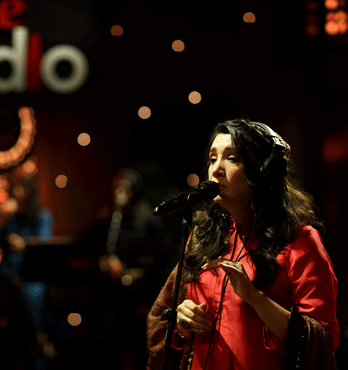Roshe

by Ayesha binte Rashid
Once upon a time, there was a King who ruled over a valley that was known far and wide for its beauty, immortalised in the words of poets and the melodies of traveling bards. The valley’s lakes were crystal clear, holding mirrors up to the sky, and its mountain peaks reached up to the heavens, glistening with snow. Sparkling rivers wove down the valley’s hills, coniferous trees standing guard on their banks, and fields of saffron colored the valley’s floors.
One day, legend tells us, the King went on an excursion in the hills, with no one but his horse for company, and chanced upon a woman whose beauty matched that of his realm’s. It wasn’t her beauty that enthralled the King, however – the woman was singing to herself and it was her nightingale voice, and the depth of her poetic verses, that won the King’s heart. It was, as they say, love at first sight. The King swept the woman away to his palace, made her his Queen and all was well. For a time.
The valley, we are told, found itself in the throes of conflict with neighboring lands, and the King was called away for negotiations. On his travels, he was captured, never to see his home again. The lovely Queen, waiting in vain, was never to see her husband. Distraught, the poetess Queen removed herself from court. Wandering the hills and forests in the valley, she wrote verses and rhymes filled with longing for her beloved. “Walọ myạạni,” she called out, “ poshe maduno” (Come to me, my sweet beloved).
The poetess of our story is Habba Khatoon, the King, Yousuf Shah Chak and the valley, Kashmir.
In her despair, Habba Khatoon wrote poetry that set new standards for the use of poetic meters and idioms; poetry that traveled down through centuries, influencing the work of contemporary poets that have since written about Kashmir. One such poet was Peerzada Ghulam Ahmad, known popularly as Mahjoor, an iconic poet in his own right who lived and wrote during the early 1900’s. Inspired by the poetry of Habba Khatoon, Mahjoor wrote Roshe, a poem similar in meter and rhyme to one written by the poetess Queen many centuries ago, filled with the same despair and longing that she once felt, a despair that remained the Kashmiri people’s experience during Mahjoor’s life.
It is now 2019 and Zeb Bangash takes the stage on set at Coke Studio’s Season 12. “Tsol-hạma,” she begins to sing Mahjoor’s poetry in her own nightingale voice, “Roshe, roshe” (You have abandoned me). She joins these verses with Habba Khatoon’s own words, “ Walọ myạạni poshe maduno.”
For Zeb, the idea of understanding Kashmir was key -- the Kashmir represented today in mainstream media reflects only glimpses of its history and culture. You hear about Kashmir on the news and in politics, Zeb points out, and everyone has an opinion on it. But what do the Kashmiri people eat, wear, and speak? What is their lived culture? “Not only are we not connected to Kashmir’s culture, we’re letting it die away,” says Zeb. And with it, the valley’s story.
These considerations came to Zeb in 2014 when she met a group of Kashmiri students in Delhi who expressed appreciation for Paimona and asked her to do more songs related to Kashmir. More songs? Zeb was confused. She hadn’t thought of Paimona as a song about Kashmir. But it has therabab, the students said, which is a Kashmiri instrument. The rabab is considered by most as having come from Afghanistan, but few know that the instrument is also owned by the people of Kashmir.
‘Sing a song in our language’, the students said. ‘Pahari?’ asked Zeb. ‘No, our language, Kashmiri,’ they insisted. Zeb asked them to speak their language and was struck by how unique it was. This sparked her thirst to sing a song in Kashmiri, a journey that led her to Habba Khatoon and, eventually, to Roshe.
The ever-curious artist had many discussions with Kashmiri friends about the origin of Roshe and its significance to the Kashmiri people today, discovering that the song is still popular in the valley. Many versions of it have been sung, and it can often be heard in Kashmiri households and can be recited by Kashmir’s children. The loss in its verses, its lamentation speaks to the Kashmiri people even today.
“If we put aside what is right and wrong, the truth remains that in places where there is trouble, our loved ones are sometimes separated from us. This idea of missing someone when you don’t know where they are, it’s so relevant to places that have turmoil and that has been the experience of Kashmiri people now for centuries,” says Zeb.
And so, when she takes the stage at Coke Studio, Zeb is thinking of Kashmir. And of Habba Khatoon. And beauty. “She made her loss into something beautiful. I was with her and was trying to bring her spirit into the performance.”
Her spirit lives on in Kashmir even today, wandering its hills, bemoaning the loss of what once was. Roshe has traveled through the centuries to every home in Kashmir, to every woman’s lips, to every gathering that has music. Habba Khatoon’s yearning and despair speaks through history to the Kashmiri people, enabling them to package their experience in poetry and music. As the yearning lives on, the story of Kashmir prevails.
